Table of Contents
Introduction
If your dog suddenly starts hacking with a loud, dry cough that sounds almost like a goose honk, it can be incredibly unsettling. I’ve had more than a few clients rush into the clinic, visibly worried, thinking their dog might have something lodged in their throat or worse. But more often than not, the diagnosis turns out to be something far less dramatic yet still important to address: kennel cough. Understanding kennel cough causes and treatment can help you take the right steps early, whether your dog picked it up at daycare, the groomer, or just from sniffing around at the park.
Also known in veterinary circles as Canine Infectious Respiratory Disease Complex (CIRDC), kennel cough isn’t a single disease. It’s a syndrome caused by a mix of bacterial and viral infections, making it tricky to pin down and frustratingly easy to spread. One day your dog’s fine; the next, they’re coughing every time they get excited or pull on the leash.
As a veterinarian practising in Ottawa, I’ve treated everything from mild kennel cough caught at the groomer to complex, lingering cases in older rescue dogs. And what I’ve seen repeatedly is that early recognition, appropriate treatment, and a strong prevention plan make all the difference.
In this article, I’ll share five evidence-based but eye-opening insights into kennel cough causes and treatment. We’ll look at what causes that raspy cough, how to tell the difference between a mild viral case and something more serious, when antibiotics are truly needed, and how to keep your pup safe if they’re headed to daycare, training, or the local boarding kennel.
Whether your dog’s already coughing or you just want to be prepared, this guide will help you feel confident in managing and preventing this all-too-common kennel cough scenario.
Key Takeaways
- Kennel cough is a respiratory illness caused by both viral and bacterial agents, often co-infecting the same dog.
- The most common bacterial culprit is Bordetella bronchiseptica, while viruses like canine parainfluenza and adenovirus-2 play key roles.
- Most mild cases resolve without antibiotics, but mixed infections may require medications like doxycycline.
- Vaccines can reduce disease severity but don’t always prevent infection completely.
- Recognising early signs and managing exposure risk, especially in social dogs, is essential for prevention.
Insight #1: Kennel Cough Isn’t Just One Disease
You can also see: https://doglifeexpert.com/prevent-lyme-disease-in-dogs/
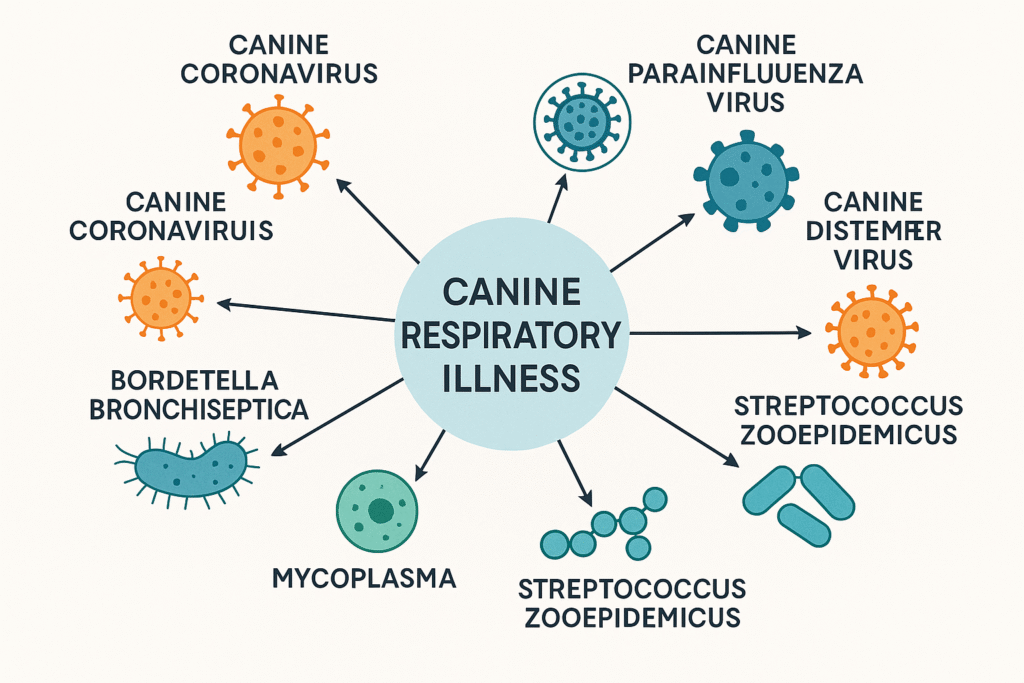
Most dog owners think of kennel cough as a single illness, but it’s part of a broader syndrome known as Canine Infectious Respiratory Disease Complex (CIRDC). This complex involves several pathogens that often attack simultaneously.
For instance, Bordetella bronchiseptica was detected in 78.7% of dogs with respiratory symptoms, compared to just 45.6% of healthy dogs in a large European multicentre study published in Pathogens (PMC). Similarly, canine parainfluenza virus (CPIV) was found in 37.7% of symptomatic dogs, but only 7.8% of healthy ones.
Other culprits include canine respiratory coronavirus, adenovirus‑2, distemper virus, and canine herpesvirus, according to the American Veterinary Medical Association (AVMA).
Dogs in kennels or shelters are especially vulnerable due to close quarters and shared air. Importantly, 47.9% of Bordetella cases also had a viral co-infection, highlighting the mixed nature of most CIRDC presentations (Pathogens, PMC).
Insight #2: Viral and Bacterial Kennel Cough Look Alike, But Act Differently
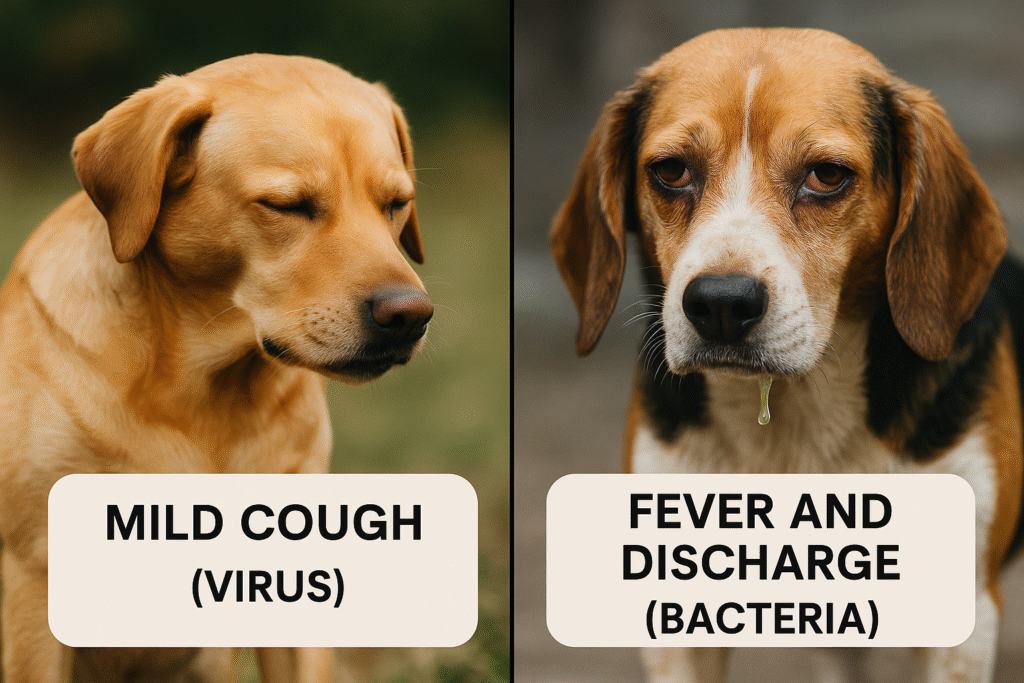
Viral kennel cough is often caused by primary agents like canine parainfluenza (CPIV), canine adenovirus-2 (CAV-2), or canine respiratory coronavirus (CRCoV). Symptoms typically include a dry, hacking cough, sneezing, and mild nasal discharge. Fever is variable. Most dogs recover in about 7–10 days with supportive care alone, according to the AKC Canine Health Foundation and AVMA.
Bacterial infections, especially those driven by Bordetella bronchiseptica, can occur alone or worsen a viral illness. This bacterium causes inflammation of the trachea and bronchi, often producing a persistent honking cough, sometimes with retching or gagging. notes that Bordetella can be shed for weeks after symptoms resolve, and it’s present in up to 45% of healthy dogs.
The overlapping signs make it hard to tell which organism is responsible without testing. But duration and severity often hint at bacterial involvement, especially if symptoms persist beyond 10 days or worsen.
Insight #3: Diagnosis Is Usually Clinical, But Lab Testing Helps in Severe Cases
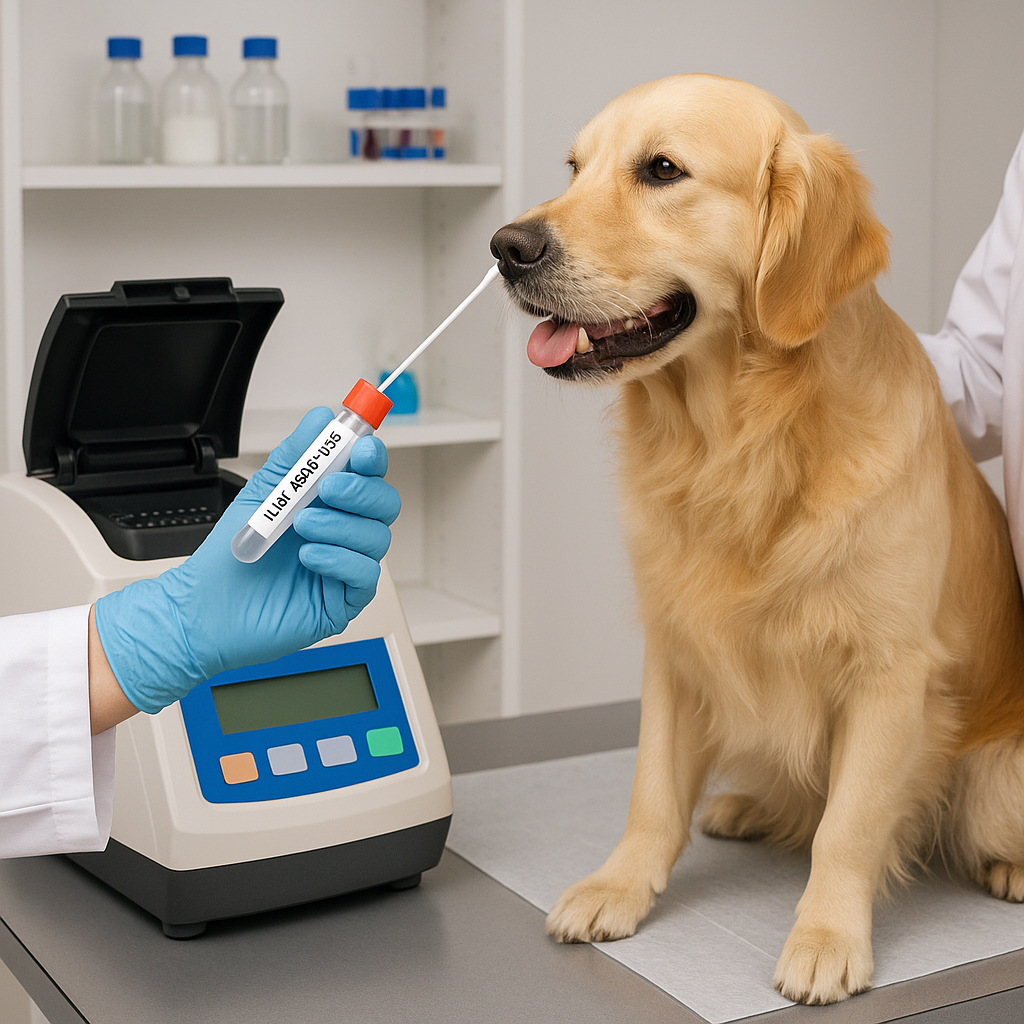
Most cases of kennel cough are diagnosed clinically based on your dog’s symptoms and recent exposure history, especially if they’ve been to a kennel, daycare, or groomer. According to the AVMA, a veterinarian typically listens for the characteristic honking cough and checks for signs like nasal discharge or mild fever.
However, when symptoms persist or worsen, advanced diagnostics may be used. These include PCR testing, culture, and bronchoalveolar lavage, which help identify the specific pathogens involved. For example, in one case report of CPIV infection, cytology failed to detect the virus, but PCR testing confirmed it, underscoring the importance of molecular diagnostics in certain scenarios (Veterinary Sciences, MDPI).
In shelter settings or outbreaks, identifying the precise mix of pathogens helps tailor treatment and quarantine protocols. This approach also aids in detecting emerging threats like canine pneumovirus, which is still being studied as part of the CIRDC spectrum (PMC).
Insight #4: Treatment Depends on the Cause; Not All Cases Need Antibiotics
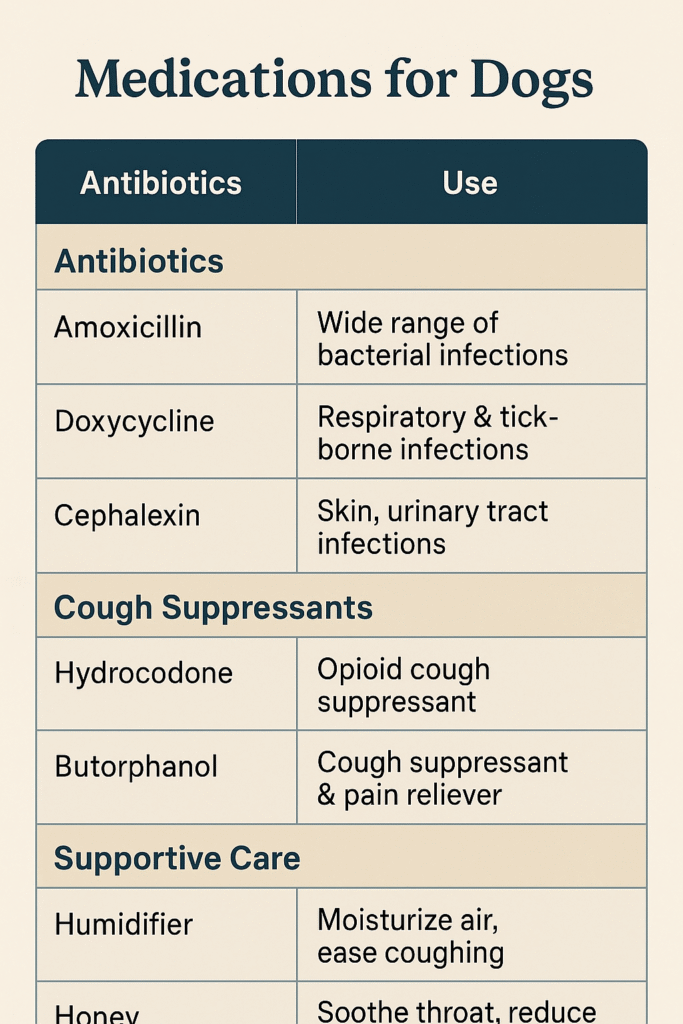
In viral-only kennel cough cases, treatment is mostly supportive. Dogs typically recover with rest, hydration, and time. Mild anti-inflammatories may ease discomfort, but they don’t shorten the course of the illness. The Cornell University College of Veterinary Medicine emphasises that antibiotics are not needed in straightforward viral cases.
However, in bacterial or mixed infections, especially those involving Bordetella bronchiseptica, antibiotics like doxycycline are commonly used. In shelters, aerosolised tetracyclines may be preferred to treat outbreaks efficiently. Treatment typically lasts 7–14 days, depending on the severity and duration of the cough.
In more serious cases, especially if pneumonia develops, hospitalisation may be required. This could involve IV fluids, oxygen therapy, and broader-spectrum antibiotics, guided by culture and sensitivity tests (Cornell Vet).
Insight #5: Vaccination Helps but Isn’t Foolproof
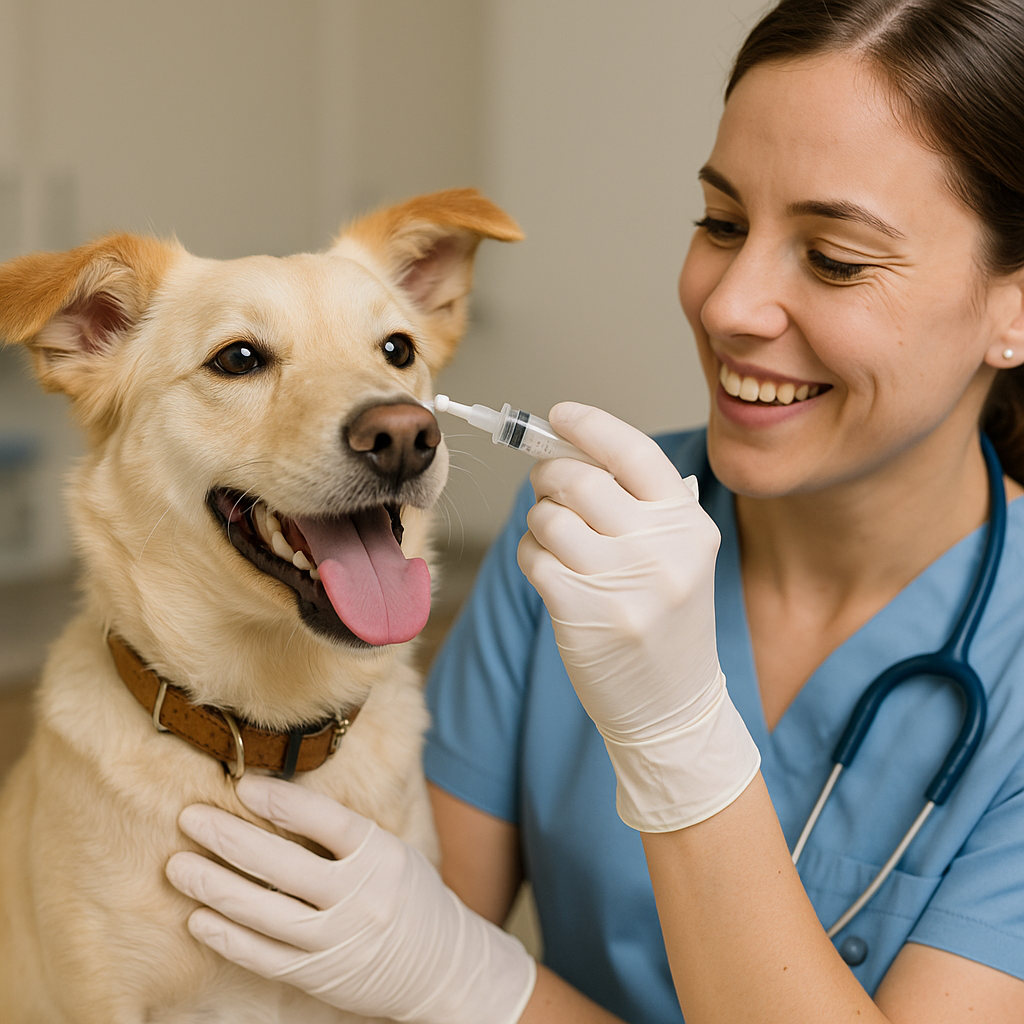
Vaccination plays a major role in reducing the severity and spread of kennel cough, especially in social or at-risk dogs. The DA2PP vaccine, which includes distemper, adenovirus-2, and parainfluenza, is considered a core vaccine in Canada and North America.
The Bordetella vaccine is categorised as non-core, but it’s strongly recommended for dogs in group environments. It’s available in injectable, intranasal, and oral forms. According to The Spruce Pets, intranasal and oral vaccines often provide faster localised immunity, making them ideal for dogs needing protection before boarding or daycare.
That said, no vaccine offers 100% protection. Vaccinated dogs can still contract mild cases and even shed the organism. This makes hygiene measures (e.g., proper ventilation, disinfection, and isolation of sick animals) essential in high-risk environments such as shelters and kennels, as emphasised by the AVMA.
Vet-Approved Tips for Dog Owners

Helping your dog recover from kennel cough and preventing it in the first place starts with informed, proactive care. Here are five tips I regularly share with clients in practice:
- Know your dog’s risk level
If your dog visits kennels, daycares, or groomers, talk to your vet about vaccine timing and hygiene precautions. Cornell Veterinary College recommends early Bordetella vaccination before exposure. - Recognise early warning signs
A sudden, honking cough after excitement or exercise, especially in a recently boarded dog,s is a hallmark symptom. Don’t wait for discharge or fever to appear. - Support recovery at home
Provide rest, avoid smoke or cold air, and use cough suppressants only if prescribed. Keep your dog well hydrated and offer high-value food to encourage eating. - Monitor for complications
If your dog becomes lethargic, develops a fever, laboured breathing, or refuses food, these could signal secondary infection or pneumonia. Seek veterinary care immediately. - Isolate sick dogs and clean them well
Kennel cough is highly contagious. Isolate infected dogs for at least 10–14 days and disinfect shared surfaces, bowls, and bedding regularly (AVMA).
What We Still Don’t Know About Kennel Cough
Despite decades of research, kennel cough remains a scientifically complex illness, especially because it’s not caused by a single pathogen.
For example, it’s still unclear exactly how co-infections impact disease severity. Some dogs infected with multiple pathogens show only mild signs, while others develop pneumonia. A multicentre study on CIRDC found that almost half of Bordetella-positive dogs also carried at least one virus, but symptoms varied widely between individuals (PMC).
Also, molecular diagnostics like PCR may detect vaccine strains, which can make interpretation tricky. A CPIV-positive result, for instance, may reflect recent vaccination rather than active infection, especially if clinical signs are mild (MDPI).
Finally, newer respiratory pathogens like canine pneumovirus are still being studied. Their role in CIRDC is not fully understood, though early reports suggest they may contribute to outbreaks (PMC).
Summary Table: Kennel Cough Causes, Symptoms & Treatments
| Cause | Common Signs | Treatment Approach | Prevention Strategy |
|---|---|---|---|
| Canine Parainfluenza (CPIV) | Dry, honking cough, mild discharge | Supportive care: rest, fluids | DA2PP vaccination minimises exposure |
| Bordetella bronchiseptica | Persistent cough, gagging, and possible fever | Antibiotics (e.g., doxycycline), cough suppressants | Intranasal/oral Bordetella vaccine, good hygiene |
| Mixed Infections | More severe or prolonged symptoms | Combo therapy: antibiotics + supportive care | Combined vaccination + environmental sanitation |
| Emerging agents (e.g., pneumovirus) | Variable signs, uncertain progression | Case-dependent; may mimic viral illness | Under investigation; hygiene & surveillance critical |
This table summarises the kennel cough causes and treatment options discussed in the article, offering a quick reference for owners and veterinary professionals alike.
Frequently Asked Questions About Kennel Cough
1. How can I tell if my dog’s cough is kennel cough?
Kennel cough often sounds like a dry, hacking or honking cough, especially after exercise or excitement. It may be accompanied by sneezing or mild nasal discharge. A vet can help confirm the diagnosis based on history and clinical signs.
2. Is kennel cough contagious to other pets or humans?
Yes, kennel cough is highly contagious to other dogs. While rare, Bordetella bronchiseptica can infect cats and immunocompromised humans. Always isolate sick pets and practice good hygiene.
3. Should I give antibiotics for kennel cough right away?
Not always. Viral cases usually don’t require antibiotics and resolve with supportive care. Your vet may prescribe antibiotics like doxycycline if there’s evidence of bacterial or mixed infection.
4. Can my dog get kennel cough even if vaccinated?
Yes. Vaccinated dogs can still develop mild forms of kennel cough, but the vaccine reduces severity and transmission. It’s especially useful before boarding, grooming, or dog park visits.
5. How long should I keep my dog home after kennel cough?
Most vets recommend at least 10–14 days of home isolation after symptoms appear. Dogs may still shed bacteria or viruses after symptoms resolve, so check with your vet before resuming group activities.
Final Thoughts: Understanding and Managing Kennel Cough
Hearing your dog cough persistently can be alarming, especially when it’s loud, harsh, and doesn’t go away after a day or two. But in most cases, kennel cough causes and treatment are more manageable than pet owners initially fear. With the right information and a little timely support, this common canine illness is usually treatable and preventable.
As a veterinarian, I always remind clients that kennel cough isn’t one-size-fits-all. It can be triggered by viruses like canine parainfluenza or bacteria like Bordetella bronchiseptica, and many dogs carry these pathogens without showing symptoms. What makes a difference is your dog’s immune status, recent exposures, and overall health.
Understanding the full picture of kennel cough causes and treatment helps you make smarter decisions, like when to seek care, whether antibiotics are necessary, and how to prevent the illness from spreading to other pets. Remember: prevention matters. Keeping your dog up to date on core and non-core vaccines, especially before boarding or social outings, can reduce the risk.
If your dog is coughing or was recently around other dogs that were ill, don’t panic, but do check in with your veterinarian. We’re here not just to treat your pet, but to help you prevent illness and tailor a care plan based on your dog’s age, lifestyle, and environment. With the right approach, most dogs bounce back quickly and get right back to tail-wagging in no time.

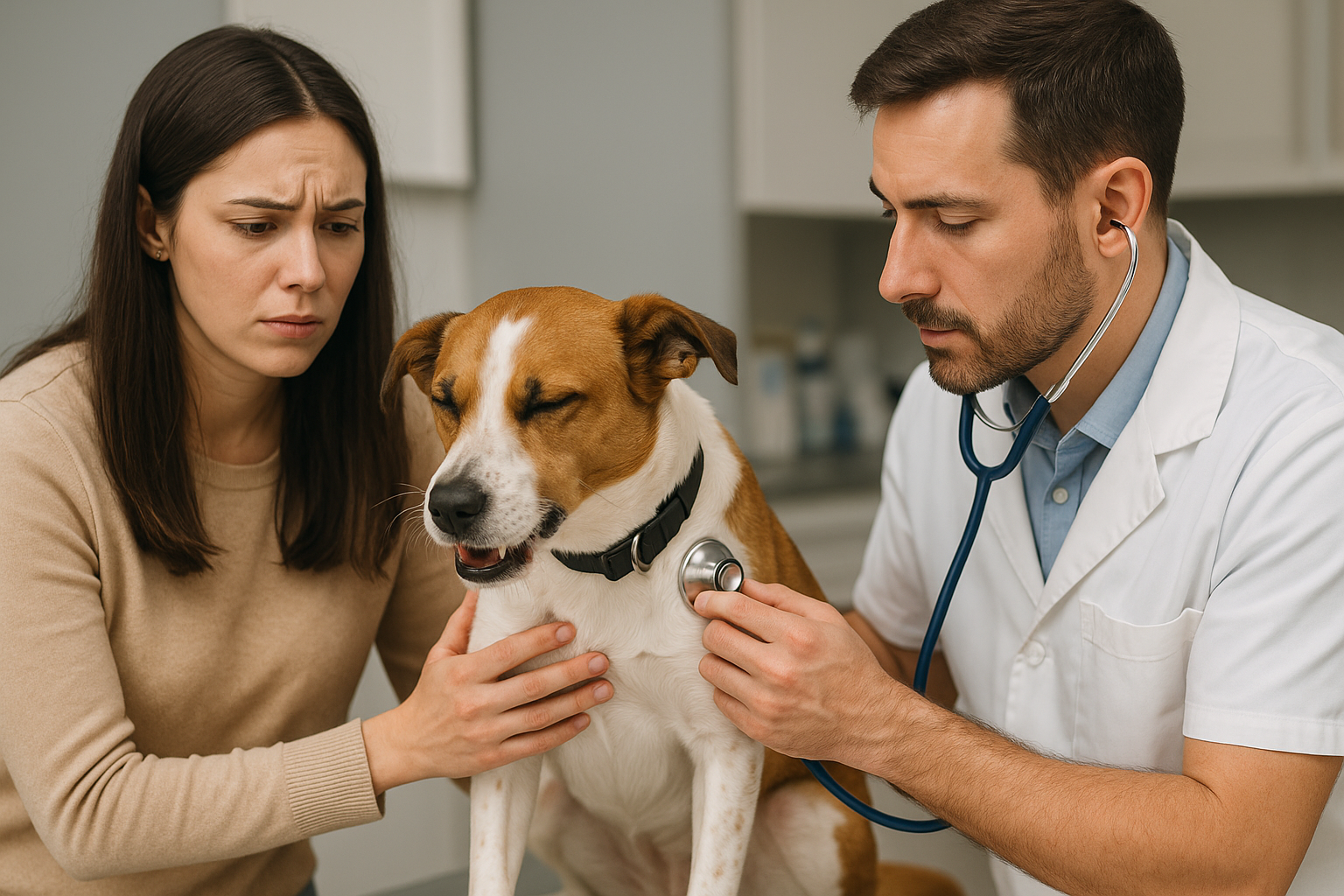
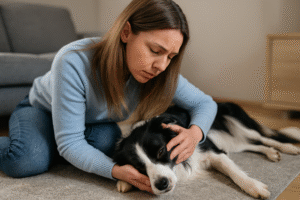
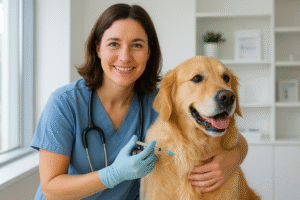
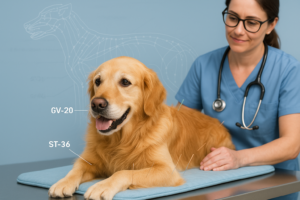
Pingback: Rabies in Dogs 2025: Your Must-Read Owner’s Guide